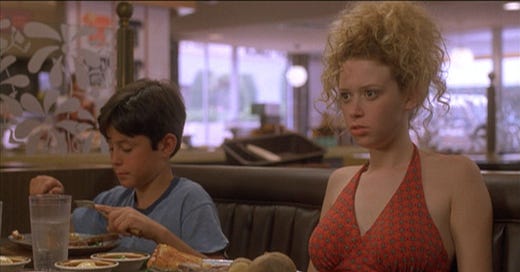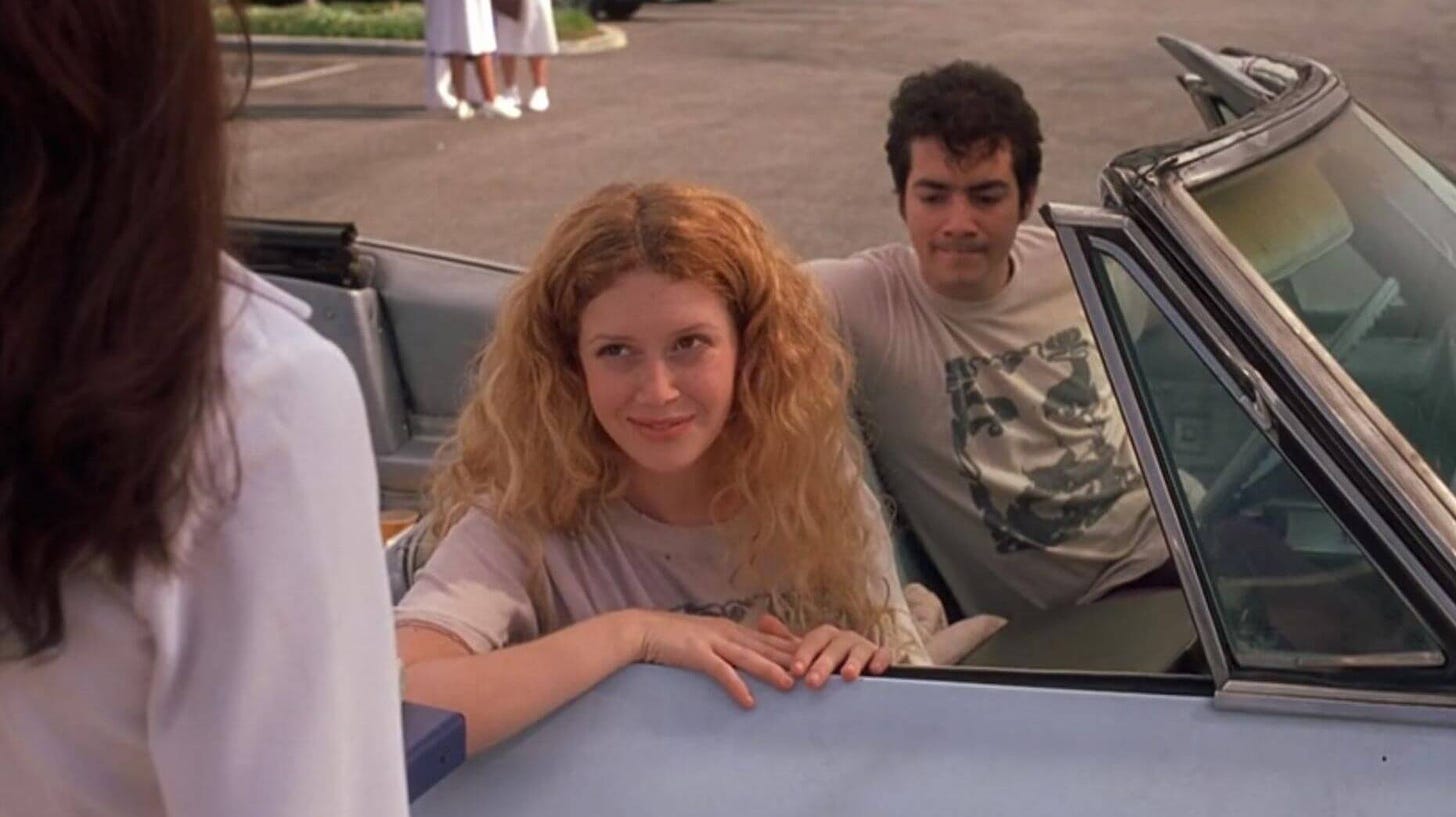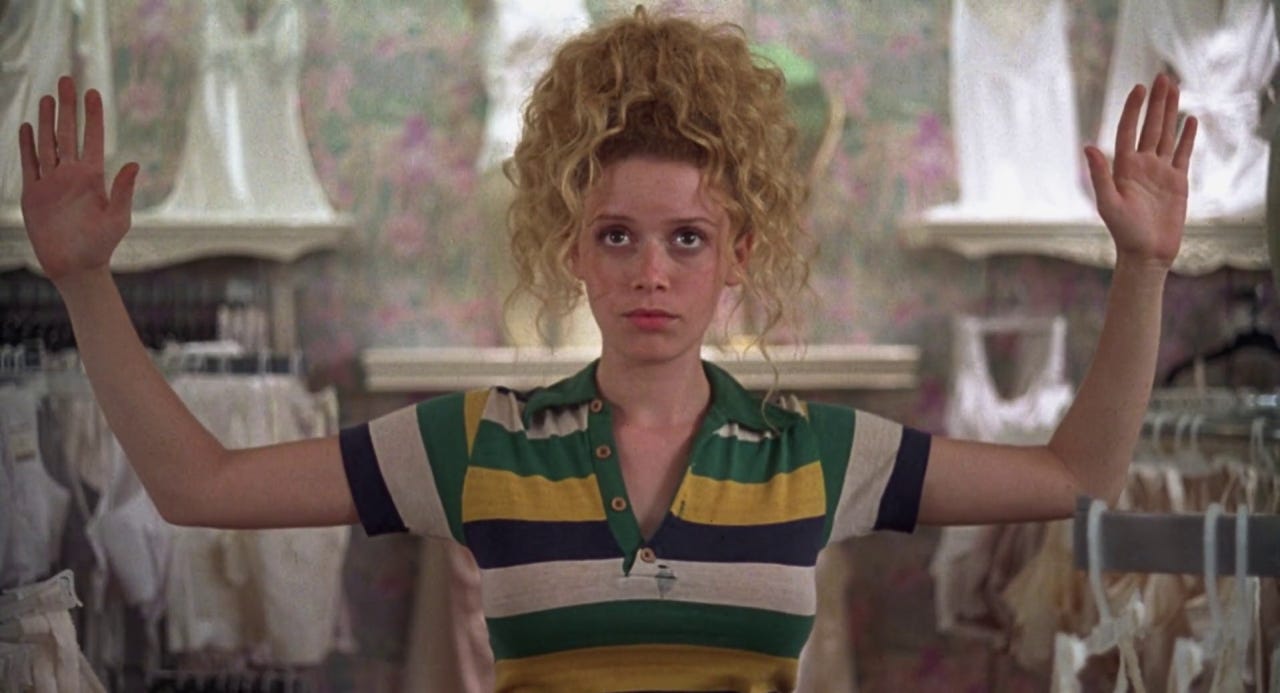'Slums of Beverly Hills' at 25: Nomads on the fringes of a celebrity kingdom
Tamara Jenkins' directorial debut vividly imagines a transitional summer in the life of a 15-year-old.
Ever since Kelly Reichardt’s Showing Up came out earlier this year, I’ve been thinking a lot about the virtues of proportionality, of filmmakers who have the discipline to tell small stories that are rich in specific detail. “Termite art,” in other words. Showing Up is about a sculptor (Michelle Williams) and art-school instructor getting new pieces together for an exhibition at a small gallery that appears to be off the town’s main drag. She is not hoping for some big break. She is not exorcizing some personal demon through her figurines. She is simply doing the work, following some expressive impulse while managing the hassles of academia and a flaky landlord who won’t replace the water heater. It’s a deceptively “minor” work that, in its modest way, tells us something profound about its maker, an indie filmmaker and teacher who’s never seen art as a calling card to a more extravagant commercial destination.
If you want to stretch the definition to the breaking point, Tamara Jenkins’ debut feature Slums of Beverly Hills, which turns 25 this week, is a coming-of-age film. The central character is an incoming high-school freshman grappling with changes to her body and she does, at one point, surrender her virginity to a pot dealer with a shitty apartment nearby. (She doesn’t want it to go any further, she warns him. “It’s a building thing.”) But the film is just a small, vividly suggestive piece of a teenager’s life, without much in the way of transformative events. She’s one of three kids managed by a cash-strapped 65-year-old father who keeps them in Beverly Hills because of the schools, but we never actually see the inside of a school. We only see the inside of three apartments he can’t afford on his own and get halfway to a fourth that surely won’t be the last.
If you’re searching for a prevailing motif here, Slums of Beverly Hills is a film about breasts. That’s not to say that Jenkins was announcing herself as the new Russ Meyer, but she shares the same preoccupation here, because breasts are a source of anxiety and self-image on one end and clumsy, misplaced desire on the other. The film starts with 15-year-old Vivian Abromowitz (Natasha Lyonne) filling out a halter top so generously that her father Murray (Alan Arkin) makes her put on a bra, which is a far more conspicuous fashion statement. At the other bookend, Vivian catches her father groping her beautiful, mentally unstable cousin Rita (Marisa Tomei) in a moment of weakness that deeply rattles her. In between, Vivian’s rapid development brings her attention that sparks her curiosity at times, but mostly alarms her, to the point where she seeks out a cosmetic surgeon for a breast reduction consultation. Coming to terms with womanhood isn’t easy, but it’s several degrees harder in a succession of tiny apartments with an elderly father and two brothers running around in their tighty-whities.
The year is 1976. As the film opens, the nomadic Abromowitzs are stealing off again before the crack of dawn, with Murray, a car salesman given to plaid suits, hurrying the kids out to the car before the landlord can do anything about it. Practically speaking, it’s as if the place is on fire—everyone has a minute or two to grab the essentials and the rest gets left behind. A new dumpy apartment on the fringes of Beverly Hills awaits, but it’s too early in the morning, so the family piles into Murray’s car, the only nice thing they own, and set about their moving day ritual: Driving past celebrity homes and stopping at Sizzler for steak and eggs. Murray’s life is burdensome and humiliating, but the man loves a good piece of meat when he can afford it. There’s no happier moment in the film for him than the day he comes home with a premium cut of corned beef.
Vivian assesses the new place via narration: “Casa Bella. Another dingbat. Dingbats, that’s what they’re called. Two-story apartment buildings featuring cheap rent and fancy names that promise the good life but never deliver.” The Abromowitzs will surely get kicked out of this dump, too, but in the meantime, Vivian strikes up an uneasy relationship with their next-door neighbor Eliot (Kevin Corrigan), who sells pot, wears a Charles Manson t-shirt, and takes enough of an interest in her that she allows him to cop a feel. Their fortunes take a turn, however, when Murray’s troubled niece Rita breaks out of a rehab facility and hitchhikes her way into their lives. (Breasts again play a critical role.)
Having Rita around underlines the precariousness of the family’s situation. On the plus side, Rita’s wealthy father Mickey (Carl Reiner), who’s been floating his brother money for nearly a half-century, opens up his wallet to pay for a nicer apartment across the street and fund his daughter’s half-considered attempt at nursing school. But to keep the money tap flowing, the family has to band together to cover for her, which means supervising her one day in nursing school and trying to prevent the inevitable relapse. Vivian loves having another woman in the apartment—they speak in a secret gibberish language and have a blast dancing around with Rita’s vibrator—but Rita is also a cautionary tale, a warning of what might happen if her adulthood goes wildly astray.
It is not surprising to learn that Jenkins drew Slums of Beverly Hills from her own experiences as a lower-middle-class Jewish kid who grew up an outsider in a city known worldwide for extravagant wealth. (In one of the film’s funnier running bits, Vivian’s crude older brother David, played by the brilliant David Krumholtz, attaches stories to various celebrity homes, like Lucille Ball’s assistant telling trick-or-treaters on Halloween that “Ms. Ball is issuing no treats this year.”) The great benefit of the film’s proportionality is that the small details are exceptionally vivid, whether they’re behavioral observations or production decor, like ratty shag carpeting or a busted curtain runner or a piece of embroidered white upholstery that doesn’t hold up to menstrual blood.
Though she’s only directed two features since—2007’s The Savages and 2018’s Private Life, both excellent—Jenkins has a gift for illuminating the essence of family dynamics through a small piece of their lives. The Savages is about middle-aged siblings (Philip Seymour Hoffman and Laura Linney) who are forced to confront their ambivalent feelings about their father when he’s hospitalized for dementia; Private Life manages the emotional rollercoaster of a couple (Paul Giamatti and Kathryn Hahn) whose struggles to conceive lead them to turn to their 25-year-old niece for egg donation. (Their niece attends Bard College, the school where Reichardt happens to teach in real life. See, that lede didn’t come out of nowhere!) Three features in 25 years isn’t a breathless pace—and Jenkins has sharp words about the systemic reasons for her lack of prolificacy—but the characters and worlds of these films feel fussed-over, like she’s actually used all that time to work on drafts.
Before Slums of Beverly Hills, Lyonne had logged time as a child model and actress, and joined the ensemble for Woody Allen’s Everyone Says I Love You, but this was her first lead role and she’s a revelation. That big shock of curly hair would make her impossible to miss even without the halter top, and so Vivian’s curse is to manage a lot of unwanted attention. Yet Lyonne isn’t a wallflower type, and it’s not quite right to think about Vivian as shy. With her preternaturally raspy voice, Lyonne gives Vivian a mischievous sense of humor and sarcasm that shields her adolescent vulnerabilities effectively for most of the film. It’s tempting, for example, to understand the older Eliot’s sexual interest in her as predatory, but she’s the one tapping the accelerator and the brakes in that relationship—just as she does when she takes his car for a driving lesson in an empty parking lot. Vivian has something to learn from Rita, who has all sorts of life experience under her belt, but she’s no naif. She’s learned to improvise under less-than-ideal conditions.
When Arkin died in late June, Lyonne called him “the favorite of all my movie dads” and that affection is central to what makes Slums of Beverly Hills so affecting. As Murray, Arkin is playing a character not dissimilar to his bottom-of-the-big-board real estate salesman in Glengarry Glen Ross, riding a perpetual losing streak that still has him relying on his brother’s money and internalizing the shame that goes along with it. Arkin and Lyonne have a frisky comic dynamic together, but even (or perhaps especially) when they’re fighting, the love Murray and Vivian have for each other is unmistakable. Like any quality parent, Murray is obsessed with getting his kids in the right school district, and there’s no amount of punishment he’s unwilling to absorb for it. His personal sacrifices are deep and Vivian is old enough not only to recognize them, but to share them.
He’s also deeply lonely, which leads to the film’s most provocative development. To salve his heartache, Murray has been dating a well-to-do, twice-divorced woman (Jessica Walters) in a nice building nearby, but she has made it clear that she’s only looking for a little companionship in her advancing age. Sex is out of the question. His frustration manifests itself in an awful private moment with Rita where he slips his hand under her shirt, neither realizing that Vivian is watching from a crack in the door. Murray quickly acknowledges his mistake and Rita forgives him just as quickly, but it’s a difficult mistake to unwind for them and even more difficult for Vivian to process. Her disappointment in both sends her reeling.
For Slums of Beverly Hills to turn on a scene where a beloved father sexually assaults his niece is a risky dramatic gambit to say the least, but Jenkins doesn’t cast judgment on it so cleanly. When Vivian confronts Rita in a public bathroom—and the two of them talk gibberish to keep the details from reaching a stranger in a nearby stall—Rita explains, “Sometimes a person gets so hungry, he might do something that he’s not so proud of.” Rita knows that hunger, most recently from a loser that’s gotten her pregnant, but remorse doesn’t usually follow. For Vivian, it’s not just a lesson in the mistakes desperate adults can make, but the grace damaged people can show each other. The Abromowitzes will move forward and continue their shambolic adventures together, with Vivian learning a little bit more about the way the world works. And also learning that Eva Gabor manages a poodle farm in her backyard.







Thank you so much for highlighting this wonderfully warm, heartfelt, and at times zany picture. That gibberish scene between Tomei and Lyonne I still remember so well -- those subtitles! My only sadness is that Jenkins makes films so infrequently, but I can't complain of their quality. Here's to hoping we'll see her next film in 2029 (fingers crossed).
The Savages is one of my all-time favorites. A few months ago I caught Laura Linney in a play in NYC (with Jessica Hecht -- "Summer, 1976"), but I think of her first and foremost as the sister to Mark Ruffalo and Philip Seymour Hoffman, always.
Was 13 when this came out and I caught it on like a 'Starz' trial - blew my mind it was so confident in its specifity. And yeah, have been a die-hard Krumholtz fan since then, of note here: the Luck Be A Lady scene